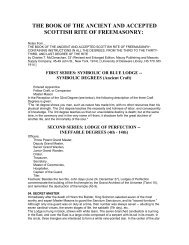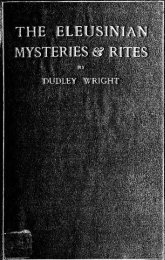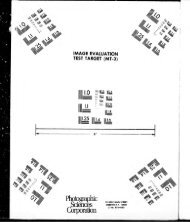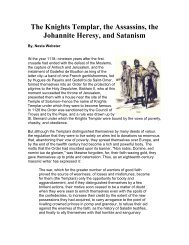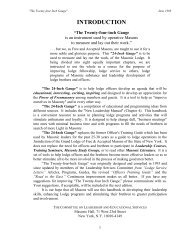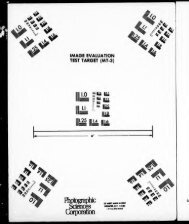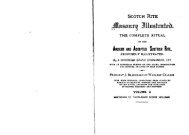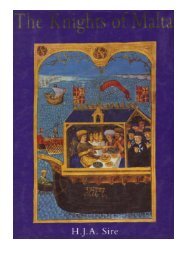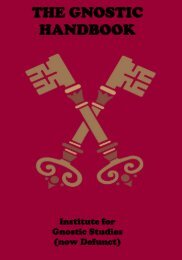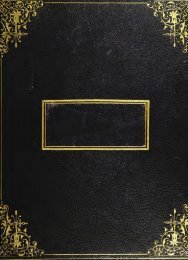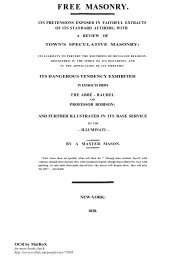The History of Initiation - The Masonic Trowel
The History of Initiation - The Masonic Trowel
The History of Initiation - The Masonic Trowel
Create successful ePaper yourself
Turn your PDF publications into a flip-book with our unique Google optimized e-Paper software.
64 HISTORY OF INITIATION<br />
omnipresent Deity. Zoroaster succeeded in prevailing<br />
on them to preserve the Sacred Fire, which, by burning<br />
on the highest hills, was liable to be extinguished by<br />
storms and tempests, in covered fire towers, 19 which were<br />
circular buildings, with a dome, and a small orifice at the<br />
top to let out the smoke. In these the sacred flame,<br />
where God was supposed to reside, was kept perpetually<br />
alive. 20 Thus the building represented the universe and<br />
;<br />
the central fire which constantly blazed within it, was<br />
figurative <strong>of</strong> the great luminary, the Sun.<br />
21 He then proceeded to remodel the Mysteries and ; to<br />
accomplish with greater effect this design, he retired to<br />
a circular cave or grotto in the mountains <strong>of</strong> Bokhara, 22<br />
which he ornamented with a pr<strong>of</strong>usion <strong>of</strong> symbolical and<br />
astronomical 23<br />
decorations, and solemnly consecrated it to<br />
the middle god or Mediator, 24<br />
Mithr-As, or as he was else-<br />
25 where denominated, the invisible Deity, the parent <strong>of</strong><br />
the universe, who was himself said to be born, or pro-<br />
24,) and to Abraham as aflame <strong>of</strong> fire ; (Gen. xv., 17,) and again to<br />
Moses as a fire at Horeb; (Exod. iii., 2.) and to the whole assembly<br />
<strong>of</strong> the people at Sinai, when he descended upon the mountain in fire ;<br />
(Exod. xix., 18,) and they further urged that Moses himself had told<br />
them that their God was a consuming fire, (Deut. iv., 24,) which was<br />
reechoed more than once; (Deut. ix., 3,) and thence the Jews were<br />
weak enough to worship the material substance, in lieu <strong>of</strong> the invisible<br />
and eternal God.<br />
19<br />
Hyde, de Eel. vet. Pers., c. 8, et passim.<br />
20 " <strong>The</strong> Orientals make Nimrod the author <strong>of</strong> the sect <strong>of</strong> the Magi,<br />
or worshippers <strong>of</strong> fire and tell us that ; accidentally seeing fire rise<br />
out <strong>of</strong> the earth at a great distance from him in the East, he wor-<br />
shipped it; and appointed one Andesham to attend the fire there,<br />
and throw frankincense into it." (Univ. Hist., vol. i., p. 90.)<br />
21 Pococke. Spec. Hist. Arab., p. 147.<br />
13<br />
Porph. de Ant. Nymph., p. 254.<br />
23 <strong>The</strong>re do not exist two opinions respecting the early knowledge<br />
<strong>of</strong> astronomy in this quarter <strong>of</strong> the globe. Indeed, Pliny says, (Nat.<br />
Hist, 1. i., c. 26) Belus, inventor fui1 sideralis scientiae; and Belus<br />
was the grandson <strong>of</strong> Ham.<br />
24 <strong>The</strong> Persians were so deeply impressed with this amiable characteristic<br />
<strong>of</strong> their god, that they denominated every person who acted<br />
in the capacity <strong>of</strong> a mediator between two contending parties ; Mithras.<br />
(Plut. Isid. et Osir., p. 43.)<br />
25<br />
Mithras, whether corporeal or incorporeal, was unquestionably<br />
taken by the Persians for the Supreme Deity, according to that <strong>of</strong><br />
Hesychius, Mi&pas 6 TCQIOTOS ev IJepoais debs, Mithras the first god<br />
among the Persians ; who was, therefore, called in the inscription,<br />
(Apud Gruter. <strong>The</strong>saur. Inscrip., p. 34,) Omnipotent! Deo Mithras.<br />
(Cudw. Intell. Sys., 1. i., c. 4.)<br />
*



